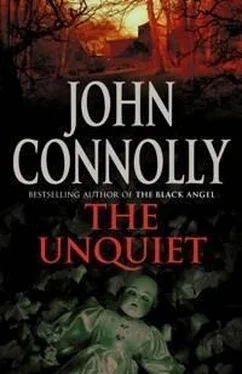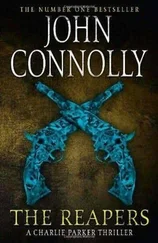“Daniel Clay,” she said, as she sipped her coffee. “I remember him, although I’ve only ever seen a couple of examples of his work. He fell into the category of the gifted amateur. It was all very…tortured initially, I suppose you’d say: intermingled bodies, pale with eruptions of reds and blacks and blues, and all sorts of Catholic iconography going on in the background. Then he stopped doing those and moved on to landscapes. Misty trees, ruins in the foreground, that kind of thing.”
Rebecca had shown me some slides of her father’s work earlier that day, along with the single canvas she had retained. It was a painting of Rebecca as a child, although it was a little dark for my liking, the child a pale blur amid gathering shadows. I confessed to June that I hadn’t been very impressed with the rest of his work either.
“They’re not to my taste, it must be said. I always thought his later work was one step above paintings of moose and yachts, but then it wasn’t really an issue. He sold privately and didn’t exhibit, so I never had to find a polite way of saying ‘No.’ There are one or two people in Portland who were quite serious collectors of his work, though, and I know he gave away some of his paintings to friends. His daughter occasionally sells some of those that are still in her possession, and a couple of potential buyers usually come out of the woodwork. I think most of those who collect him probably knew him personally, or are attracted by the mystery surrounding him, for want of a better term. I heard that he stopped painting entirely sometime before he went missing, so I suppose they have a certain rarity value.”
“You remember anything about his disappearance?”
“Oh, there were rumors. There wasn’t much in the newspapers about the circumstances-the local press tends to be circumspect about such things at the best of times-but most of us knew that some of the children he’d been trying to help were subsequently abused again. There were people who wanted to blame him, I suppose, even among those who were prepared to believe that he wasn’t directly involved.”
“You have an opinion on it?”
“There can be only two views: Either he was involved or he wasn’t. If he was, then there’s nothing more to say. If he wasn’t, well, I’m no expert, but it can’t have been easy getting some of those kids to talk about what happened to them to begin with. Perhaps the additional abuse just pushed them further and further into their shells. I really can’t say.”
“Did you ever meet Clay?”
“Here and there. I tried to speak with him at a dinner we both attended, but he didn’t say very much. He was quiet and distant, very soft-spoken. He appeared overburdened by life. That would have been very shortly before his disappearance, so in this case appearances may not have been deceptive.”
She broke off to give instructions to a young woman who was hanging up a canvas by the window.
“No, no, that’s upside down!”
I looked at the canvas, which appeared to be a painting of mud, and not pretty mud either. The young woman looked at the canvas. The young woman then looked at me.
“How can you tell?” I said, and heard my words echoed. The young woman and I had both spoken at precisely the same moment. She smiled at me, and I smiled back. I then did a rough calculation of the difference in our ages and decided that I should limit myself to smiling at people who were born before 1980.
“Philistines,” said June.
“What’s it supposed to be?” I asked her.
“It’s an untitled abstract.”
“Does that mean the artist doesn’t know what it is either?”
“Possibly,” June conceded.
“Back to Daniel Clay. You said that the people who collected his work probably knew him. Any idea who some of those people might be?”
She walked over to the corner and absentmindedly scratched her dog behind the ear. The dog barked at me again, just to disabuse me of any notions I might have had about joining in.
“Joel Harmon is one.”
“The banker?”
“Yes. Do you know him?”
“I know of him,” I said.
Joel Harmon was the retired president of IBP, the Investment Bank of Portland. He was one of those credited with rejuvenating the Old Port during the eighties, and his picture still appeared in newspapers whenever the city threw a celebration of something or other, usually with his wife on one arm and a crowd of slavering admirers surrounding them, all aroused by the lingering smell of fresh dollar bills. His popularity could fairly be ascribed to his wealth, his power, and the attraction those two elements generally arouse in those with significantly less of either. It was whispered that he had an “eye for the ladies,” even though his looks came pretty far down on the list of his attributes, probably somewhere between “can carry a tune” and “cooks spaghetti.” I’d seen him around, but we’d never been introduced.
“He and Daniel Clay were friends. I believe they might have met at college. I know that Joel bought a couple of Clay’s paintings after he died, and was given others as gifts during his lifetime. I suppose he passed Clay’s test of suitability. Clay was very particular about those to whom he sold or gave his work. I can’t imagine why.”
“You really didn’t like his paintings, did you?”
“Or him, I guess. He made me uneasy. There was something peculiarly joyless about him. Joel Harmon is having a dinner party in his house later this week, by the way. They’re a pretty regular occurrence, and I have a standing invitation anytime I wish to attend. I’ve put some interesting artists his way. He’s a good customer.”
“Are you asking me to be your date?”
“No, I’m offering to be yours.”
“I’m flattered.”
“You should be. Perhaps you’ll get to see some of Clay’s paintings. Just try not to offend Joel too grievously, there’s a dear. I have bills to pay.”
I assured June that I would be on my best behavior. She didn’t look impressed.
I drove back to Scarborough and dumped the Saturn, instantly feeling ten years younger in the Mustang, or at least ten years less mature, which wasn’t the same thing at all. I called Rebecca Clay to confirm that she was still planning to leave at the agreed time, then asked her to get someone to walk her to her car. She was due to look at a vacant storefront on Longfellow Square, so I waited for her in the parking lot behind Joe’s Smoke Shop. There were fifteen or sixteen cars parked there, none of them occupied. I found a space that allowed me a view of Congress and the square, bought a grilled chicken sandwich with green peppers at Joe’s sandwich counter, then ate in the car while I waited for Rebecca Clay to arrive. A couple of homeless guys with shopping carts stood smoking in the alley beside the lot. Neither of them matched the description of the man who was following Rebecca.
She called me when she was passing the bus depot at St. John, and I told her to park in front of the building she was visiting. The woman who was trying to rent the first-floor space was waiting outside for her when she arrived. The two of them entered together, and the door closed safely behind them. The windows were large and clean, and I could see both of them clearly from where I sat.
I didn’t notice the squat man until he went through an odd routine while lighting a cigarette. He seemed to have appeared from out of nowhere to take up a spot on one of the metal crash barriers outside the lot. He was holding a cigarette vertically between the thumb and forefinger of his right hand and rotating it gently, probably to get a smoother draw, and his attention was entirely fixed on the women across the street. Still, there was something sensual about the motion of his fingers, a product, perhaps, of the way he was staring so intently at Rebecca Clay through the window of the store. After a time he slid the cigarette slowly into his mouth, wetting it against his lips for a moment before applying a match to the tip. Then, instead of simply throwing the match away, or blowing it out, he held it between the same thumb and forefinger as before and allowed the flame to burn down toward the tips of his fingers. I waited for him to discard it as the pain increased, but he did not. When the end of the match was no longer visible, he released his grip upon it and allowed it to fall into the palm of his hand, where it burned into blackness against his skin. He turned his hand, allowing the charred wood to fall upon the ground. I clicked off a picture of him on the little digital camera that I kept in the car. As I did so, he looked around, seemingly aware now that the attention of another was fixed upon him in turn. I slid down farther in my seat, but I had caught a glimpse of his face, and had seen the three parallel scars on his forehead of which Rebecca had spoken. When I looked back he appeared to be gone, but I sensed that he had merely retreated into the shade offered by Joe’s building, for I saw a wisp of smoke carried out upon the street by a stray breeze.
Читать дальше












